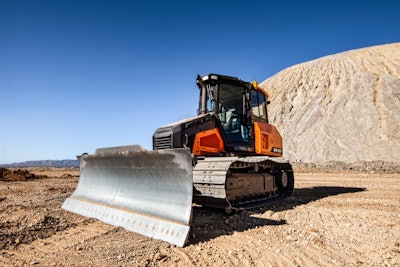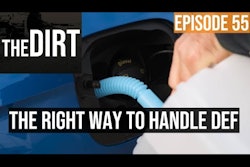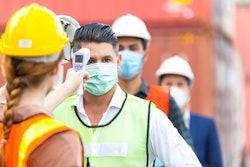
Doosan Infracore plans to rebrand in 2023 with a new name, following the company’s acquisition by Hyundai Heavy Industries in August.
The new name will be announced at next year’s ConExpo, says Todd Roecker, vice president growth initiatives for Doosan Infracore North America. A team of Doosan and Hyundai representatives based in South Korea have begun the rebranding process.
Roecker said the initial intent was to wait three years before rebranding, but when talking with dealers, the overwhelming response was “why wait?”
“‘If you're going to have to change your brand anyway, let's do it quicker,’” Roecker related during an interview January 25 with Equipment World. “And so we're going down the path of transitioning our brand later this year, and hopefully announcing it at ConExpo in 2023.”
Roecker expects the new name will tie in with Doosan’s Concept-X, which combines artificial intelligence and information and communications technology, as well as advancing other technologies, such as autonomous operation, electric excavators, battery packs and hybrid fuel cells.
“I would imagine it's going to speak something to that type of technology and that type of product in the marketplace, but I don't foresee that it's going to be some version of Hyundai,” he said.
“The plan is to continue to have two independent brands, two independent distribution models, basically competing in good faith. So if you're going to do that you have to differentiate yourself appropriately to avoid that confusion.”
The name change will be a global one, not just for North America. Though the name will change, Roecker says, the Doosan machines will keep their distinctive orange color.
Hyundai purchased Doosan Infracore in August after Doosan Heavy Industries & Construction ran into financial trouble and decided to sell its construction equipment segment to pay off debt. So far, both Doosan Infracore North America and Hyundai Construction Equipment have been operating separately as subsidiaries under the newly created Hyundai Genuine. The acquisition included the Doosan orange construction line and the Doosan Engine group, but not Doosan Portable Power or Bobcat.
Roecker acknowledges there has been confusion with customers and within the industry about what to call the companies since the acquisition and to what extent Doosan would maintain its separate identity and autonomy. When discussing Doosan’s future, Roecker expects the manufacturer to continue separately from Hyundai Construction Equipment indefinitely but under a new name. He notes that when Hyundai acquired Kia, the Korean automaker kept its separate identity.
“This is certainly nothing new to Hyundai,” he says. “When they acquired Kia they have lived that; they kept Kia independent. Hyundai’s independent, their Genesis brand is independent. And as a result of keeping those independent brands and independent distributions, it's yielded them to get to that global top three in the automotive industry.”
He adds that the acquisition of Doosan Engine gives Hyundai an in-house solution rather than having to outsource its engines.
Hyundai and Doosan together want to rise into the top-five ranking for construction equipment manufacturers in the world by 2025. Roecker says that goal is still in sight and achievable.
He notes that it is unlikely to see many joint Hyundai-Doosan dealerships in the U.S. He said there seems to be little interest in that from both brands’ dealer networks.
“In my experience, if a dealer has 30% share in one brand, and they bring in another competing brand, they probably still have 30% market share. They certainly don't have 60%.
“And I think it's logical for Hyundai to recognize that and not to expect that they're going to crossover or combine the brands or combine the distribution for that purpose.”
He notes, too, that for the deal to be approved in Korea and other countries Hyundai had to ensure it wouldn’t violate fair trade agreements in those respective countries. “They had to lay out very clearly to those governments that their plan is to keep the brands independent,” he explains.
Doosan has been the stronger brand of the two in the construction equipment world. It is ranked 10th globally with $9.1 billion in sales, according to the 2021 KHL Yellow Table. Hyundai comes in at No. 21 at $2.3 billion in sales, according to the Yellow Table.
For North America, Roecker points to Hyundai’s strong brand recognition, especially due to its automotive products. Roecker says he has already begun to see a benefit for Doosan, which is no longer part of a financially strapped corporation. Hyundai has been investing more in Doosan and looks to it to help boost Hyundai’s position in the equipment industry, he says. It’s also helped with Doosan’s plans to grow its dealer network.
“I think the perception is there's strength behind us now, maybe more so than there was before,” he says. “There are finances behind us more so than there was before.”
The name change comes at a time when Doosan is unleashing up to 35 new products over the next two years, including its first lineup of compact excavators and its first dozers.
One of Doosan’s main focuses before and after the Hyundai deal is to increase its dealer network in North America. Since 2018, the company has expanded dealer coverage from 54% of North America to 67%, Roecker said at a recent media event.
“We need to find more dealers, stronger dealers that can cover a larger footprint, that have better capabilities to satisfy the customers’ needs,” he said at the event. “We're really making a conscious effort to focus on dealerships that have larger territories, multiple locations.”
As for its current dealers, Roecker said during our interview, they were surprised about the decision to change the name.
“There was a little concern,” he said. “But I think they recognize mid- and long-term it's the right approach.
“Some dealers were like, ‘Well, then why am I going to continue to invest in my advertising and my branding?’”
Roecker responds, “The stronger that your dealership brand is and the stronger that you align with this Doosan brand makes it that much easier to transition to this new brand. If you don't have a strong brand in the marketplace, and then you change your brand, you may as well just be starting over.”
Roecker says Doosan will continue to invest in its current brand until the renaming. “We continue to be bullish in our advertising efforts and driving that brand awareness, because we're a strong proponent and believer that if our brand becomes stronger and it becomes, whatever brand X, it's going to be easier to associate those two together.”
He also sees Hyundai placing a greater focus overall on its newly expanded construction equipment business, with the goal of reaching the top five globally by 2025.
“They've made a conscious effort by creating Hyundai Genuine to isolate and invest in the construction industry globally. In the past, Hyundai Construction Equipment was a small piece under Hyundai Heavy Industries,” he says. “Now it's isolated; they're leveraging this as their next focus to drive revenue dollars through the Hyundai Heavy umbrella. … They are investing very heavily.”











